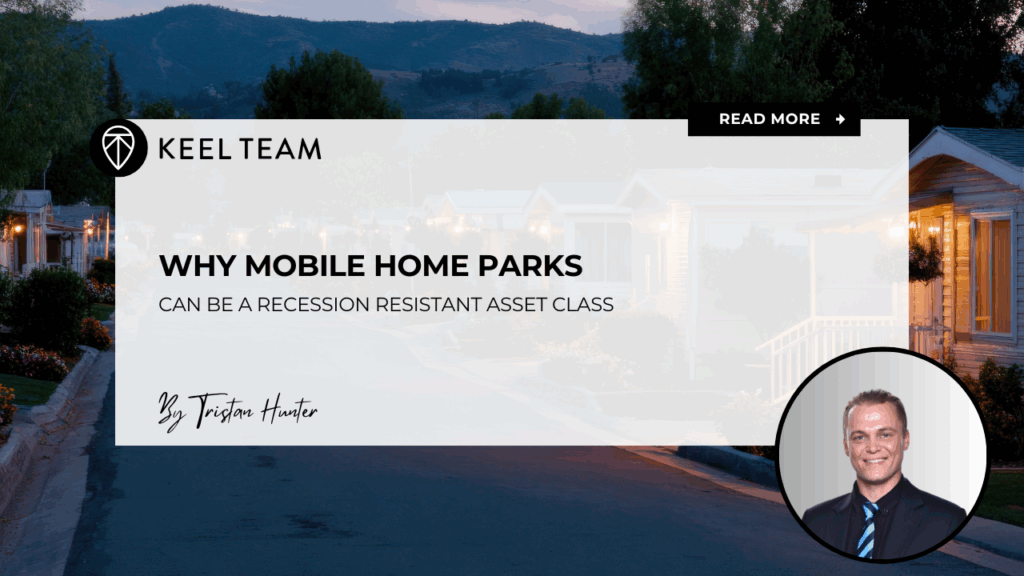Why Mobile Home Parks Can Be a Recession Resistant Asset Class
-
 Tristan Hunter - Investor Relations
Tristan Hunter - Investor Relations

In times of economic uncertainty, investors often look for real estate assets that may hold up better than others. One asset class that has drawn increasing attention is the mobile home park. While no investment is completely immune to downturns, mobile home parks are often described as recession resistant. This perception comes from unique factors tied to affordability, demand, and limited supply.
This article explores why mobile home parks may show recession resistant traits during economic slowdowns, what risks still exist, and how investors can think about this asset class within a diversified portfolio.
The Affordable Housing Gap
Housing Demand Outpaces Supply
One of the largest drivers of resilience for mobile home parks is the ongoing shortage of affordable housing. Across the United States, rents for apartments and single-family homes have climbed faster than wage growth. At the same time, homeownership has become more difficult due to rising property prices and higher interest rates.
Mobile home parks often fill this affordability gap. A tenant living in a mobile home community may pay a fraction of the cost compared to renting an apartment or buying a house in the same area. As a result, demand for mobile home park living can stay steady or even increase when the economy slows and families look for more cost-effective housing options.
Download our FREE eBook on the Top 20 things to know BEFORE investing in mobile home parks!
Affordability as a Long-Term Driver
Because mobile home parks cater to residents seeking lower housing costs, they may not experience the same rapid declines in occupancy that other real estate sectors face during recessions. While luxury apartments might see tenants downgrade, mobile home parks often sit at the base of the housing ladder. This affordability factor is a key reason investors view them as more stable during downturns.
Resident Stability and Retention
High Moving Costs Encourage Stability
Unlike traditional rentals, residents in mobile home parks typically own their home but rent the lot it sits on. Moving a mobile home can be expensive, often costing thousands of dollars. Because of this, residents are less likely to leave once they are established in a community.
This dynamic can create longer average tenancy, which may support consistent occupancy rates. Even during recessions, the high cost of moving discourages turnover, potentially stabilizing cash flow for investors.
Community Ties Add Another Layer
Many mobile home park residents form strong community ties, knowing neighbors for years and relying on local connections. These social bonds can further reduce turnover. Stable communities often contribute to smoother operations and can make the asset more appealing to long-term investors.
Limited New Supply
Zoning and Regulatory Barriers
Another factor supporting the resilience of mobile home parks is the limited creation of new supply. In many regions, zoning restrictions and local opposition make it extremely difficult to develop new mobile home communities. This limited pipeline of new inventory means that existing mobile home parks are in short supply compared to demand.
Scarcity Benefits Existing Owners
Because new mobile home parks are rarely built, existing communities become more valuable over time. Even during economic downturns, investors may still view them as attractive since scarcity can cushion against oversupply pressures that sometimes hit other real estate sectors.
Recession Resistant Revenue Models
Lot Rent as a Reliable Source
In many mobile home parks, the majority of revenue comes from lot rent rather than home rentals. Residents pay monthly fees for the land their home sits on. Lot rents are usually lower than traditional rents, but because of their affordability, they can be more sustainable for residents even in tough economic conditions.
Incremental Rent Increases
Lot rent increases are often modest, which makes them less burdensome compared to sharp rent hikes in apartments. During a recession, smaller incremental increases may be easier for residents to absorb, supporting ongoing revenue. While nothing is guaranteed, this steady approach to rent growth is one reason mobile home parks are often considered more predictable.
Performance in Past Downturn
Historical Resilience
Looking back, mobile home parks have in some cases shown more stable performance compared to other property types during economic downturns. For example, while office and retail properties sometimes face steep vacancies during recessions, mobile home parks often retain higher occupancy levels.
Why History Matters—But with Caution
While past performance offers useful context, it does not predict the future. Each recession is different, and factors like job losses, financing conditions, and local economic shifts can impact any real estate investment. Still, the historical stability of mobile home parks helps explain why many investors view them as relatively resilient.

Risks to Consider
Not Risk-Free
It is important to note that mobile home parks are not risk-free. Residents may still default on lot rent during severe downturns. Local market conditions can also affect performance. In areas where jobs disappear, even affordable housing may see stress.
Operational and Regulatory Risks
Managing mobile home parks requires experience. Infrastructure issues, utility management, and resident relations can all affect performance. Additionally, some states have introduced rent control measures or stronger tenant protections, which could impact future revenue growth.
Financing and Exit Risks
Like any real estate asset, mobile home parks depend on capital markets. Rising interest rates or tighter lending conditions may reduce refinancing options or affect exit strategies. These external risks must be part of any investor’s consideration.
Why Investors Pay Attention
Portfolio Diversification
Because mobile home parks behave differently than other real estate asset classes, they can provide diversification benefits. An investor holding a mix of apartments, office, retail, and mobile home parks may reduce portfolio volatility during recessions.
Institutional Interest Growing
For years, mobile home parks were dominated by smaller, private owners. In recent years, institutional investors and private equity funds have entered the space, drawn by the sector’s stability and demand profile. This growing institutional participation reflects the broader recognition of mobile home parks as a potential hedge during uncertain times.
Key Takeaways for Investors
What Makes Mobile Home Parks Stand Out
- Strong demand fueled by the affordable housing shortage.
- High moving costs leading to resident stability.
- Limited new supply due to zoning restrictions.
- Steady lot rent revenues that may hold up during downturns.
- Historical resilience relative to other real estate sectors.
What to Watch Out For
- Market-specific risks tied to employment and local economy.
- Operational complexity, including infrastructure and management challenges.
- Potential regulatory changes impacting rent growth.
- Financing and refinancing risks in shifting capital markets.
Conclusion
Mobile home parks may offer a unique blend of affordability, stability, and scarcity that makes them appear more resilient during economic downturns. While no asset is fully recession resistant, the characteristics of mobile home parks—such as consistent demand, limited supply, and high resident retention—support their reputation as a recession resistant asset class.
For investors seeking diversification and potential downside protection, mobile home parks could represent an option worth exploring. However, as with any investment, careful due diligence, conservative underwriting, and professional management are essential. By approaching mobile home park investing with realistic expectations and a long-term mindset, investors may be able to benefit from the strengths of this distinctive real estate sector.
Are you looking for MORE information? Book a 1-on-1 consultation with Andrew Keel to discuss:
- A mobile home park deal review
- Due diligence questions
- How to raise capital from investors
- Mistakes to avoid, and more!
Disclaimer:
The information provided is for informational purposes only and is not investment advice or a guarantee of any kind. We do not guarantee profitability. Make investment decisions based on your research and consult registered financial and legal professionals. We are not registered financial or legal professionals and do not provide personalized investment recommendations.

Tristan Hunter - Investor Relations
View The Previous or Next Post
Subscribe Below 👇





